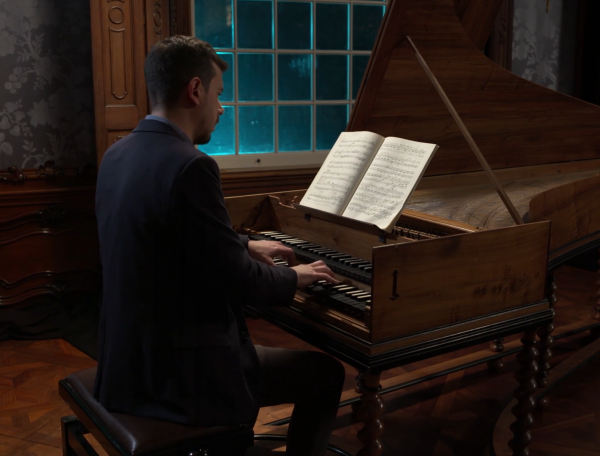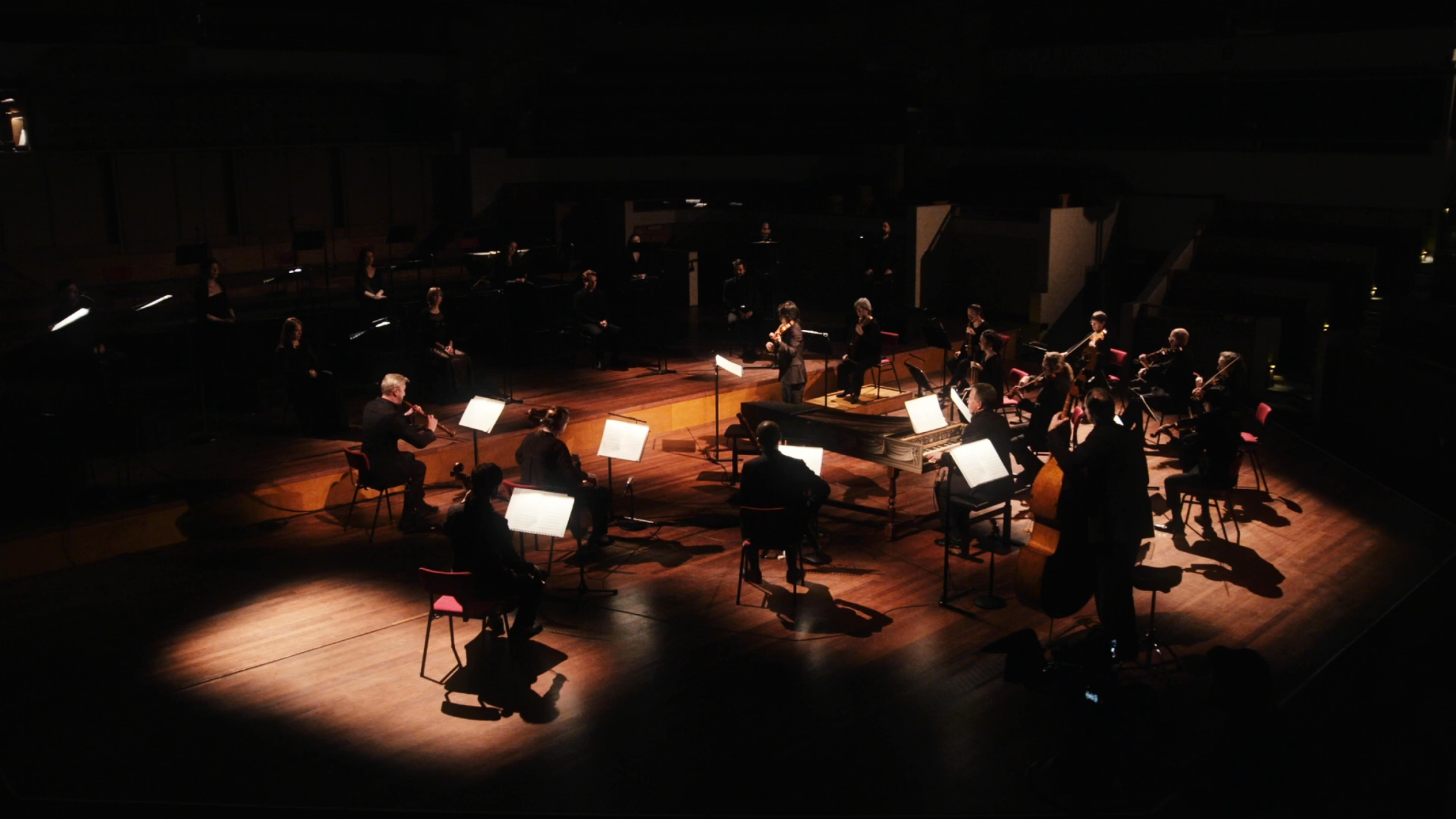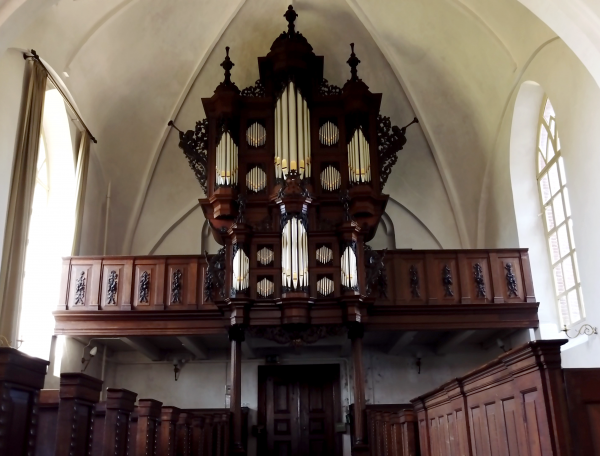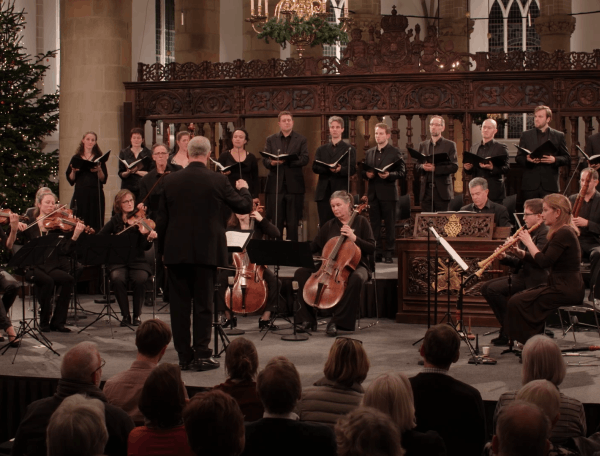

Ich hatte viel Bekümmernis
BWV 21 performed by the Netherlands Bach Society
conducted by Shunske Sato
TivoliVredenburg, Utrecht
Behind the music
An unexpected farewell
Vivaldi’s violin concerto is echoed in the opening chorus
When Bach worked briefly at the court of Weimar, in 1703, a young prince was living there. The six-year-old Johann Ernst IV of Saxe-Weimar, born in 1696, was the son of Bach’s employer. Maybe Bach already recognised his musical talent, as years later the two of them were connected through music.
In 1708, the prince was entering his teens, when Bach returned to Weimar in July of that year. Their shared love of music received a boost after the prince returned from a long trip to the Netherlands, in July 1713. He brought new music with him, including Vivaldi’s L’estro armonico, which had been printed in Amsterdam in 1711. These violin concertos and Vivaldi’s Italian style were enthusiastically played and arranged by Bach and by Johann Ernst himself.
The Italian influence could be heard immediately in Bach’s own music of the period. In the opening chorus of this cantata, you can hear clear echoes of one of Vivaldi’s concertos. An early version of the cantata probably originated in 1713, written for the funeral of the wife of a high court official, on 8 October. The theme of the sermon for this service was psalm 94, verse 19, which is precisely the text of the opening chorus of Bach’s cantata. This early version consisted only of parts 2–6 and 9.
In March 1714, Bach was told that he must “monatlich neüe Stücke ufführen” for the court chapel. And so the church cantatas for Weimar were born. On 17 June, the third Sunday after Trinity, the longer version of this cantata was performed there. This was probably the last big work by Bach heard by Prince Johann Ernst. He was ill and travelled to a health resort. In the spring of 1714, a “holländische Kutsche” was procured and he set off on 4 July. One year later, he died without seeing Weimar or Bach again. So by chance, this cantata – with its Vivaldian opening chorus – was Bach’s farewell to the prince.
With support from
Marten and Catja van Til - de Raay
Extra videos
Vocal texts
Original
Erster Teil
1. Sinfonia
2. Chor
Ich hatte viel Bekümmernis in meinem Herzen;
aber deine Tröstungen erquicken meine Seele.
3. Arie (Sopran)
Seufzer, Tränen, Kummer, Not,
ängstlichs Sehnen, Furcht und Tod
nagen mein beklemmtes Herz,
ich empfinde Jammer, Schmerz.
Seufzer, Tränen, Kummer, Not!
4. Rezitativ (Tenor)
Wie hast du dich, mein Gott,
in meiner Not,
in meiner Furcht und Zagen
denn ganz von mir gewandt?
Ach! kennst du nicht dein Kind?
Ach! hörst du nicht das Klagen
von denen, die dir sind
mit Bund und Treu verwandt?
Du warest meine Lust
und bist mir grausam worden:
Ich suche dich an allen Orten;
ich ruf und schrei dir nach,
allein: mein Weh und Ach!
scheint itzt, als sei es dir ganz unbewußt.
5. Arie (Tenor)
Bäche von gesalznen Zähren,
Fluten rauschen stets einher.
Sturm und Wellen mich versehren,
und dies trübsalsvolle Meer
will mir Geist und Leben schwächen,
Mast und Anker wollen brechen,
hier versink ich in den Grund,
dort seh in der Hölle Schlund
Bäche von gesalznen Zähren.
6. Chor
Was betrübst du dich, meine Seele,
und bist so unruhig in mir?
Harre auf Gott!
Denn ich werde ihm noch danken,
daß er meines Angesichtes Hülfe
und mein Gott ist.
Zweiter Teil
7. Rezitativ (Sopran - Seele, Bass - Jesus)
Ach Jesu, meine Ruh,
mein Licht, wo bleibest du?
O Seele, sieh! ich bin bei dir.
Bei mir? Hier ist ja lauter Nacht.
Ich bin dein treuer Freund,
der auch im Dunkeln wacht,
wo lauter Schalken seind.
Brich doch mit deinem Glanz
und Licht des Trostes ein!
Die Stunde kömmet schon,
da deines Kampfes Kron
dir wird ein süßes Labsal sein.
8. Duett (Sopran - Seele, Bass - Jesus)
Komm, mein Jesu, und erquikke
Ja, ich komme und erquikke
und erfreu mit deinem Blikke!
dich mit meinem Gnadenblikke.
Diese Seele, die soll sterben
Deine Seele, die soll leben
und nicht leben,
und nicht sterben,
und in ihrer Unglückshöhle
hier aus dieser Wunden Höhle
ganz verderben.
sollt du erben
Ich muß stets in Kummer schweben,
Heil durch diesen Saft
der Reben,
ja, ach ja, ich bin verloren,
nein, ach nein, du bist erkoren,
nein, ach nein, du hassest mich.
ja, ach ja, ich liebe dich.
Ach, Jesu, durchsüße mir Seele und Herze!
Entweichet, ihr Sorgen, verschwinde, du Schmerze!
Komm, mein Jesu, und erquikke
Ja, ich komme und erquikke
mich mit deinem Gnadenblicke!
dich mit meinem Gnadenblicke
9. Chor
Sei nun wieder zufrieden, meine Seele,
denn der Herr tut dir Guts.
Was helfen uns die schweren Sorgen,
was hilft uns unser Weh und Ach?
Was hilft es, daß wir alle Morgen
beseufzen unser Ungemach?
Wir machen unser Kreuz und Leid
nur größer durch die Traurigkeit.
Sei nun wieder zufrieden, meine Seele,
denn der Herr tut dir Guts.
Denk nicht in deiner Drangsalshitze,
daß du von Gott verlassen seist,
und daß Gott der im Schoße sitze,
der sich mit stetem Glücke speist.
Die folgend Zeit verändert viel
und setzet jeglichem sein Ziel.
10. Arie (Tenor)
Erfreue dich, Seele, erfreue dich, Herze,
entweiche nun, Kummer,
verschwinde, du Schmerze!
Verwandle dich, Weinen, in lauteren Wein!
Es wird nun mein Ächzen ein Jauchzen mir sein.
Es brennet und flammet die reineste Kerze
der Liebe, des Trostes in Seele und Brust,
weil Jesus mich tröstet mit himmlischer Lust.
11. Chor
Das Lamm, das erwürget ist,
ist würdig zu nehmen Kraft
und Reichtum und Weisheit und Stärke
und Ehre und Preis und Lob.
Lob und Ehre und Preis
und Gewalt sei unserm Gott
von Ewigkeit zu Ewigkeit,
Amen, alleluja!
Translation
Part One
1. Sinfonia
2. Chorus
I had much grieving in my heart;
but your [my God’s] consolations restore my soul.
3. Aria (Soprano)
Sighs, tears, grief, distress,
Anxious yearning, fear and death
Gnaw at my constricted heart;
I feel misery, pain.
Sighs, tears, grief, distress!
4. Recitative (Tenor)
How is it that you, my God,
In my distress,
In my fear and dismay,
Have turned yourself from me entirely?
Ah, do you not know your child?
Ah, do you not hear the lamenting
Of those who are
Linked to you by covenant and faithfulness?
You were my delight
And have become cruel to me;
I seek you in all places;
I call and cry for you;
Yet my “woe and ah”
Now looks as though it were entirely unknown to you.
5. Aria (Tenor)
Streams of salted tears,
Floods, rush forth constantly.
Storm and waves harm me,
And this tribulation-filled sea
Will weaken me of spirit and life;
Mast and anchor will break;
Here I sink to the seabed;
There [I] peer into the jaws of hell [and see]:
Streams of salted tears.
6. Chorus
Why do you sadden yourself, my soul,
and why are you so restless within me?
Wait for God; f
or I will yet thank him,
because he is the help/salvation of my countenance,
and my God.
Part Two
7. Recitative (Sopran - Soul, Bass - Jesus)
Ah, Jesus, my rest,
My light, where are you tarrying?
O soul, see, I am with you.
With me? Here [it] is indeed pure night.
I am your faithful friend,
Who also keeps watch in the darkness,
Where there are pure rogues.
Break in, then, with your luster
And light of consolation.
The hour is already coming,
When your contest’s victory wreath
Will be a sweet restorative to you.
8. Duet (Soprano - Soul, Bass - Jesus)
Come, my Jesus, and restore,
Yes, I come and restore
And gladden with your gaze,
You with my gaze of grace;
This soul that shall die
Your soul, it shall live
And not live,
And not die;
And in its misfortune-cavern
Here, out of this wound-cavity [in my rib],
Entirely decay.
You shall inherit
I must constantly hover in grief;
Healing/salvation through [my blood,] this juice of the grape;
Yes, ah yes, I am lost [from salvation].
No, ah no, you are chosen [for salvation].
No, ah no, you hate me.
Yes, ah yes, I love you.
Ah, Jesus, fill me with sweetness of soul and heart.
Escape, you worries; disappear, you pain.
Come, my Jesus, and restore
Yes, I come and restore
Me with your gaze of grace.
You with my gaze of grace.
9. Chorus
Be now again at peace, my soul,
for the Lord does good unto you.
How do heavy worries help us,
How does our “woe and ah” help us?
How does it help, that every morning
We bemoan our affliction?
We make our cross-bearing and suffering
Only greater by the sorrow.
Be now again at peace, my soul,
for the Lord does good unto you.
Do not think in the heat of your oppression
That you are forsaken by God, and that
God may seat in the bosom [of Abraham—heaven]
Him who [on earth] dines in constant good fortune.
The ensuing time changes many things
And sets to each his limit/lifespan.
10. Aria (Tenor)
Gladden yourself, soul; gladden yourself, heart;
Escape now, grief;
disappear, you pain.
Transform yourself, weeping, into pure wine;
My groaning will now be, to me, a shouting [for joy].
The purest candle[light] of love, of consolation,
Burns and flames in [my] soul and breast,
So long as Jesus consoles me with heavenly delight.
11. Chorus
The lamb that is slain
is worthy to take might
and riches and wisdom and strength
and honor and praise and adulation.
Adulation and honor and praise
and power be to our God
from eternity to eternity.
Amen, hallelujah!
transl. © Daniel R. Melamed and Michael Marissen
For the annotated version of the text and translation, see here.
Credits
-
- Release date
- 2 December 2021
-
- Recording date
- 22 April 2021
-
- Location
- TivoliVredenburg, Utrecht
-
- Violin and direction
- Shunske Sato
-
- Soprano
- Stefanie True
-
- Alto
- Ulrike Malotta
-
- Tenor
- Guy Cutting
-
- Bass
- Felix Schwandtke
-
- Ripieno soprano
- Lauren Armishaw, Marta Paklar
-
- Ripieno alto
- Bernadett Nagy, Sofia Gvirts
-
- Ripieno tenor
- João Moreira, Immo Schröder
-
- Ripieno bass
- Matthew Baker, Pierre-Guy Le Gall White
-
- Violin 1
- Sayuri Yamagata, Lucia Giraudo, Mayumi Sargent Harada
-
- Violin 2
- Pieter Affourtit, Anneke van Haaften, Kano Imada
-
- Viola
- Staas Swierstra, Femke Huizinga
-
- Cello
- Lucia Swarts, Carlos Leal
-
- Double bass
- Robert Franenberg
-
- Oboe
- Ivan Podyomov
-
- Bassoon
- Benny Aghassi
-
- Trumpet
- Robert Vanryne, Mark Geelen, Nicholas Emmerson
-
- Timpani
- Robert Kendell
-
- Organ
- Leo van Doeselaar
-
- Harpsichord
- Siebe Henstra
-
- Director and editor
- Onno van Ameijde
-
- Music recording
- Guido Tichelman, Bastiaan Kuijt, Pim van der Lee
-
- Music edit and mix
- Guido Tichelman
-
- Camera
- Martin Struijf, Bjorn Tiebout, Jesper Blok, Rieks Soepenberg
-
- Lights
- Zen Bloot
-
- Set technique
- Justin Mutsaers
-
- Project manager team
- Ron Vermeulen
-
- Assistant music recording
- Marloes Biermans
-
- Producer concert
- Imke Deters
-
- Producer film
- Jessie Verbrugh
-
- With support from
- Marten and Catja van Til - de Raay

